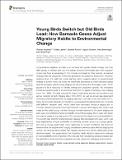Files in this item
Young birds switch but old birds lead : how barnacle geese adjust migratory habits to environmental change
Item metadata
| dc.contributor.author | Oudman, Thomas | |
| dc.contributor.author | Laland, Kevin | |
| dc.contributor.author | Ruxton, Graeme | |
| dc.contributor.author | Tombre, Ingunn | |
| dc.contributor.author | Shimmings, Paul | |
| dc.contributor.author | Prop, Jouke | |
| dc.date.accessioned | 2020-01-21T11:30:08Z | |
| dc.date.available | 2020-01-21T11:30:08Z | |
| dc.date.issued | 2020-01-09 | |
| dc.identifier | 265895736 | |
| dc.identifier | 294edc44-2db5-4c6b-aa94-e8ee9ff0c1f7 | |
| dc.identifier | 85078400975 | |
| dc.identifier.citation | Oudman , T , Laland , K , Ruxton , G , Tombre , I , Shimmings , P & Prop , J 2020 , ' Young birds switch but old birds lead : how barnacle geese adjust migratory habits to environmental change ' , Frontiers in Ecology and Evolution , vol. 7 , 502 . https://doi.org/10.3389/fevo.2019.00502 | en |
| dc.identifier.issn | 2296-701X | |
| dc.identifier.other | RIS: urn:F2747E942DF8324CE645A7BCCDBF4248 | |
| dc.identifier.other | ORCID: /0000-0002-2457-0900/work/67919211 | |
| dc.identifier.other | ORCID: /0000-0001-8943-6609/work/67919657 | |
| dc.identifier.uri | https://hdl.handle.net/10023/19322 | |
| dc.description | This research was funded by a grant from the Netherlands Organization for Scientific Research awarded to TO (ref 019.172EN.011). | en |
| dc.description.abstract | Long-distance migratory animals must contend with global climate change, but they differ greatly in whether and how they adjust. Species that socially learn their migration routes may have an advantage in this process compared to other species, as learned changes that are passed on to the next generation can speed up adjustment. However, evidence from the wild that social learning helps migrants adjust to environmental change is absent. Here, we study the behavioral processes by which barnacle geese (Branta leucopsis) adjust spring-staging site choice along the Norwegian coast, which appears to be a response to climate change and population growth. We compared individual-based models to an empirical description of geese colonizing a new staging site in the 1990s. The data included 43 years of estimated annual food conditions and goose numbers at both staging sites (1975–2017), as well as annual age-dependent switching events between the two staging sites from one year to the next (2000–2017). Using Approximate Bayesian Computation, we assessed the relative likelihood of models with different “decision rules”, which define how individuals choose a staging site. In the best performing model, individuals traveled in groups and staging site choice was made by the oldest group member. Groups normally returned to the same staging site each year, but exhibited a higher probability of switching staging site in years with larger numbers of geese at the staging site. The decision did not depend on food availability in the current year. Switching rates between staging sites decreased with age, which was best explained by a higher probability of switching between groups by younger geese, and not by young geese being more responsive to current conditions. We found no evidence that the experienced foraging conditions in previous years affected staging site choice. Our findings demonstrate that copying behavior and density-dependent group decisions explain how geese adjust their migratory habits rapidly in response to changes in food availability and competition. We conclude that considering social processes can be essential to understand how migratory animals respond to changing environments. | |
| dc.format.extent | 15 | |
| dc.format.extent | 4282897 | |
| dc.language.iso | eng | |
| dc.relation.ispartof | Frontiers in Ecology and Evolution | en |
| dc.subject | Branta leucopsis | en |
| dc.subject | Climate change | en |
| dc.subject | Decision-making | en |
| dc.subject | Explorative behavior | en |
| dc.subject | Group decision | en |
| dc.subject | Memory | en |
| dc.subject | Migration | en |
| dc.subject | Social learning | en |
| dc.subject | QH301 Biology | en |
| dc.subject | Ecology, Evolution, Behavior and Systematics | en |
| dc.subject | Ecology | en |
| dc.subject | DAS | en |
| dc.subject | SDG 13 - Climate Action | en |
| dc.subject.lcc | QH301 | en |
| dc.title | Young birds switch but old birds lead : how barnacle geese adjust migratory habits to environmental change | en |
| dc.type | Journal article | en |
| dc.contributor.institution | University of St Andrews. School of Biology | en |
| dc.contributor.institution | University of St Andrews. Centre for Biological Diversity | en |
| dc.contributor.institution | University of St Andrews. Scottish Oceans Institute | en |
| dc.contributor.institution | University of St Andrews. Institute of Behavioural and Neural Sciences | en |
| dc.contributor.institution | University of St Andrews. Centre for Social Learning & Cognitive Evolution | en |
| dc.identifier.doi | 10.3389/fevo.2019.00502 | |
| dc.description.status | Peer reviewed | en |
This item appears in the following Collection(s)
Items in the St Andrews Research Repository are protected by copyright, with all rights reserved, unless otherwise indicated.

